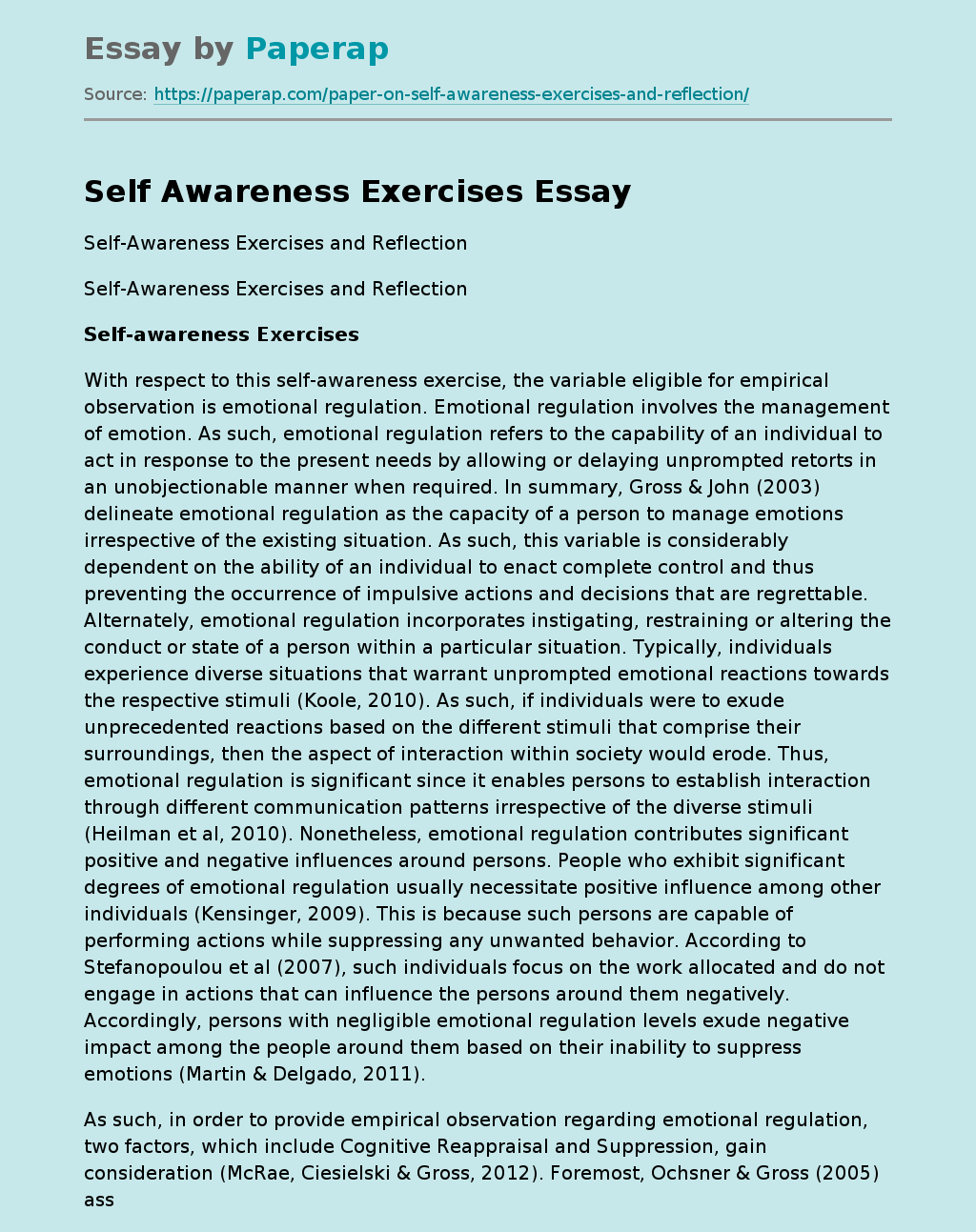Self Awareness Exercises Reflection
With respect to this self-awareness exercise, the variable eligible for empirical observation is emotional regulation. Emotional regulation involves the management of emotion. As such, emotional regulation refers to the capability of an individual to act in response to the present needs by allowing or delaying unprompted retorts in an unobjectionable manner when required. In summary, Gross & John (2003) delineate emotional regulation as the capacity of a person to manage emotions irrespective of the existing situation. As such, this variable is considerably dependent on the ability of an individual to enact complete control and thus preventing the occurrence of impulsive actions and decisions that are regrettable.
Alternately, emotional regulation incorporates instigating, restraining or altering the conduct or state of a person within a particular situation. Typically, individuals experience diverse situations that warrant unprompted emotional reactions towards the respective stimuli (Koole, 2010). As such, if individuals were to exude unprecedented reactions based on the different stimuli that comprise their surroundings, then the aspect of interaction within society would erode.
Thus, emotional regulation is significant since it enables persons to establish interaction through different communication patterns irrespective of the diverse stimuli (Heilman et al, 2010). Nonetheless, emotional regulation contributes significant positive and negative influences around persons. People who exhibit significant degrees of emotional regulation usually necessitate positive influence among other individuals (Kensinger, 2009). This is because such persons are capable of performing actions while suppressing any unwanted behavior. According to Stefanopoulou et al (2007), such individuals focus on the work allocated and do not engage in actions that can influence the persons around them negatively.
Accordingly, persons with negligible emotional regulation levels exude negative impact among the people around them based on their inability to suppress emotions (Martin & Delgado, 2011).
As such, in order to provide empirical observation regarding emotional regulation, two factors, which include Cognitive Reappraisal and Suppression, gain consideration (McRae, Ciesielski & Gross, 2012). Foremost, Ochsner & Gross (2005) assert that cognitive reappraisal allows persons to alter the emotions they experience, the intensity of the emotions based on the experience and the situations in which they experience the emotions. The second factor, Suppression, involves masking authentic emotions with irrespective of the emotional intensity of a particular situation (Richards & Gross, 2000). In the assessment, my score regarding the cognitive reappraisal factor was 6. This indicates that my ability to use cognitive reappraisal within emotional regulation is considerable considering that high scores illustrate greater exploitation of the factor. As such, the survey illustrates that the manner in which I regulate my emotions influences my communication positively with the team. Cognitive reappraisal allows a person to reappraise emotional stimuli in a dissimilar manner, which will either augment or moderate the intensity of the sentimental rejoinder educed due to the stimuli (Steinberger, Payne & Kensinger, 2011). In this particular case, upon the receipt of failure regarding a certain project within my group, my use of cognitive reappraisal will allow me to reconsider the situation in a different manner by viewing as another opportunity to improve the group’s techniques (Curseu, Boros & Oerlemans, 2012). As such, the skill will affect my communication style positively with the group since it will enable me to proceed with motivating the members of the team when assigned to another project. However, my score in exuding Suppression was 4.50, which was a low score. The score proved that I do not possess the ability to hide my emotions in emotionally intense and risky situations, which can affect the way I communicate with my team members.
References
- Curseu, P. L., Boros, S., & Oerlemans, L. A. G. (February 01, 2012). Task and relationship conflict in short-term and long-term groups: The critical role of emotion regulation. International Journal of Conflict Management, 23, 1, 97-107.
- Gross, J. J., & John, O. P. (2003). Individual differences in two emotion regulation processes: Implications for affect, relationships, and well-being. Journal of Personality and Social Psychology, 85, 2, 348–362.
- Gyurak, A., Gross, J., & Etkin, A. (January 01, 2011). Explicit and implicit emotion regulation: A dual-process framework. Cognition & Emotion, 25, 3, 400-412.
- Heilman, R. M., Crisan, L. G., Houser, D., Miclea, M., & Miu, A. C. (January 01, 2010). Emotion regulation and decision making under risk and uncertainty. Emotion, 10, 2, 257-265.
- Kensinger, E. (January 01, 2009). Remembering the Details: Effects of Emotion. Emotion Review, 1, 2, 99-113.
- Koole, S. L. (January 01, 2010). The psychology of emotion regulation: an integrative review. Psychology Press, 4, 23, 4-41.
- Martin, L. N., & Delgado, M. R. (January 01, 2011). The neural basis of positive and negative emotion regulation: implications for decision-making. Attention and Performance: Proceedings of a Symposium, 23, 311.
- McRae, K., Ciesielski, B., & Gross, J. J. (January 01, 2012). Unpacking cognitive reappraisal: Goals, tactics, and outcomes. Emotion, 12, 2, 250-255.
- Ochsner, K. N., & Gross, J. J. (January 01, 2005). The cognitive control of emotion. Trends in Cognitive Sciences, 9, 5, 242-9.
- Richards, J. M., & Gross, J. J. (January 01, 2000). Emotion regulation and memory: the cognitive costs of keeping one’s cool. Journal of Personality and Social Psychology, 79, 3, 410-24.
- Stefanopoulou, E., Argyropoulos, S., & Frangou, S. (2007). Time course of emotional responses: The effects of subjective ratings of emotional intensity and voluntary suppression. European Psychiatry, 22, 317.
- Steinberger, A., Payne, J. D., & Kensinger, E. A. (January 01, 2011). The effect of cognitive reappraisal on the emotional memory trade-off. Cognition & Emotion, 25, 7, 1237-45.
Self Awareness Exercises Reflection. (2019, Dec 05). Retrieved from https://paperap.com/paper-on-self-awareness-exercises-and-reflection/

